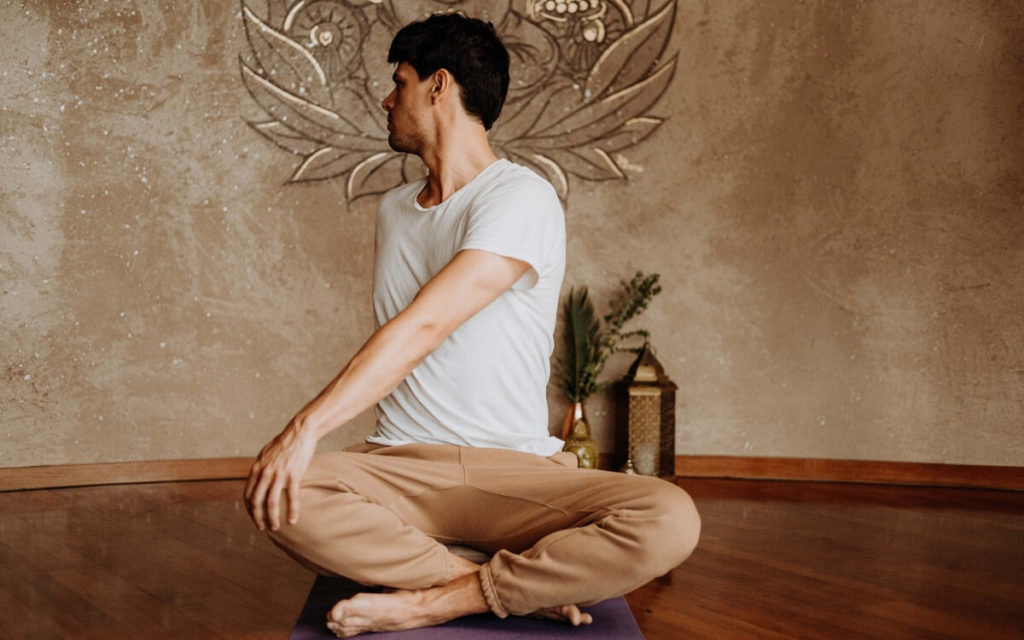A comprehensive Ayurveda morning routine helps you to start the day in a balanced way. The positive and revitalizing effects are noticeable in your everyday life through more energy. Here you will find an Ayurvedic morning routine in 6 simple steps.
The benefits of an Ayurvedic morning routine
The morning routine is an important part of the Ayurveda teachings. The extra time in the morning gives you the necessary rest for a warm breakfast, yoga and a cozy cup of tea. You will soon realize that time spent effectively in the morning is much more important than a long evening.
How you start the day determines your mood and your productivity. It is therefore all the more important that you take a lot of positive energy with you from your morning to boost your energy levels. You don't actually need an elaborate routine to do this. Ten minutes is often enough for a conscious morning.
Thanks to an Ayurvedic morning routine with various rituals, you can bring your doshas into balance. Depending on your constitution, the season and your Ayurvedic daily routine, you can customize these rituals.


A morning routine is useful not least because your mind is fresher and very clear in the morning. These routines also help you to start the day relaxed and balanced with a little me-time.
The right Ayurveda morning routine sequence in 6 steps
The Ayurvedic morning routine for a powerful start to the day is made up of several points. In the right order, they balance your doshas and provide holistic grounding.
Ayurveda morning routine at a glance:
- Get up early
- Comprehensive cleaning
- Self-massage with oil
- Movement and meditation
- Showers
- Breakfast
It's best to approach your morning ritual slowly. Start by getting used to getting up early and only gradually add more steps. When these become a habit, you can go further. Keep pausing and appreciating the small successes and changes.
The time in the morning after getting up is meant for you and your well-being. So try to avoid your smartphone and stress. This will help you stay focused on yourself and start the day in harmony.
1. get up early
Getting up early before sunrise - not after 6:30 a.m. - is an important part of the Ayurvedic morning routine. Of course, this also requires an appropriate time to go to bed the day before.
Waking up with the sun provides you with the strength and energy you need to start the day refreshed. Sleeping late, on the other hand, leads to sluggishness.


Depending on your constitution, you should sleep between 7 and 8 hours every night. It is important for a successful Ayurvedic morning routine that you slowly adjust and adapt to it. This will take some effort, especially at the beginning, but the positive effects will soon become noticeable.
Ayurvedic teachings are based on your individual doshas. Not every constitution type needs the same amount of sleep.
- Eight hours of sleep are recommended for the Vata type, with sleep between 02:00 and 06:00 being the most important. At this time, a process of cleansing takes place in the body and the mind becomes clear. This makes the morning an ideal time for meditation.
- The Pitta type gets by on seven hours of sleep and should make the most of the morning for sporting activities.
- For the Kapha type, six hours of sleep and getting up at 06:00 in the morning are recommended. For Kapha people in particular, getting up late leads to sluggishness.
Consider your constitution when setting your sleep rhythm and adjust your wake-up time accordingly. Take advantage of the morning to wake up slowly.
2. morning cleaning
Cleansing also plays a major role in Ayurveda. During the night, toxins (ama) are flushed into the excretory channels and must leave your body again.
Clean tongue and teeth
To begin with, it is best to remove any remaining bacteria by oil pulling (gandusha).


Discover our high-quality oral care products now
Incorporate Ayurvedic oral hygiene into your daily routine - you'll see how refreshed you start the day. A big plus, not only for your oral hygiene, but also for your dental health!
To do this, swish 1-2 teaspoons of coconut, olive or sesame oil in your mouth for 5-10 minutes to "pull" bacteria out of your mouth and gums. Be careful not to swallow the oil and dispose of it in the bin after rinsing. You can brush your teeth before or after oil pulling.
Toxins also accumulate on the tongue overnight. You can use a tongue scraper to gently remove these from the back to the front. Don't forget the sides of your tongue and then rinse the scraper under running water. You should also rinse your mouth thoroughly with warm water afterwards.


Afterwards, it is best to brush your teeth with herbal toothpaste to clean your mouth. This removes tartar, mucus and other toxins from your mouth.
Drink water
Start the day with a glass of boiled, lukewarm water to replenish the fluids lost during sleep. This also stimulates your gastrointestinal tract to cleanse itself and balance the pH value. Add lemon juice, honey or spices tailored to your doshas to enhance the detoxifying effect.
Eliminate toxins
In the morning, your body moves from the calming and cool lunar energy into a detoxification and absorption cycle. It is therefore very important to go to the toilet in the morning to remove toxins from the body.
Tip: If you would like to experience a more intensive cleansing, you can also take an Ayurvedic detox treatment.
Cleanse face and eyes
Splash your face and eyes with water to cleanse your face and eyes, to give you a feeling of freshness and remove dirt. Use lukewarm water for this and avoid using water that is too hot. Afterwards, Ayurvedic skin care can support the health and radiance of your skin for even more freshness.


Discover our soothing facial care products
If you would like to enhance your facial care with the beneficial contents of Ayurvedic cosmetics, you've come to the right place. We offer exclusive Ayurvedic facial care products - especially for your personal skin and constitution type!
Clean your nose
Rinsing the nasal passages with a neti pot can be helpful for cleaning. This removes dust, pollen and excess mucus. Optionally, you can then tilt your head back and drip a little sesame, sunflower or herbal oil into each nostril. This also cares for the nasal mucous membranes.
3. self-massage with oil
The (self-)massage with oil, in Ayurveda Abhyanga massage is another important part of an Ayurvedic morning routine. It is usually performed 15 minutes before bathing.
You can adapt the massage oil to your Dosha type again:
- Mahanarayan Thailam, sesame or almond oil are best suited for Vata types.
- Pitta types should choose pinda thailam, sunflower or coconut oil.
- Shulahara Thailam, sunflower or mustard oil are a good choice for Kapha types.
- Jojoba oil is suitable for all Ayurveda types.
This massage stimulates blood circulation, which in turn promotes detoxification . It also makes your skin softer and calms your nervous system.


First rub the oil all over your body, including your head, ears and nostrils. Then use circular movements for the round areas of your body, such as your face, head and joints. Stroking movements are best for the rest of your body.
Make sure you always massage in the direction of your heart. After the Abhyanga massage, you should wait at least 15 minutes before taking a bath. The oils need time to penetrate deeper into the tissue. Use the waiting time to relax, meditate or do yoga.
4. yoga and meditation
The Ayurvedic morning routine also includes exercise. Especially if you sit a lot in your everyday life, Ayurvedic ayurvedic yoga exercises are ideal for your morning. Your body and mind are brought into balance, which makes you more alert and focused. You will also have more energy for the day and your digestion will be stimulated.


Meditation in the morning helps you to find inner peace and calm so that you are more resistant to stress during the day. You become more aware of yourself and your environment and can free yourself from stressful thoughts. Meditation also gives you more clarity and focus, which helps you to increase your productivity.
At the end of the meditation, you can take some time to plan your day. Be aware of what awaits you throughout the day and plan enough breaks.
5. showers
After finishing your morning exercise and meditation, it's the right time to take a shower or even a bath. This way you can start the day feeling refreshed.
6. breakfast
A healthy breakfast is the ideal basis for starting the day full of energy. It is particularly important to consider your dosha type. This allows you to tailor your Ayurvedic diet perfectly to you and your needs.


- As a Vata type, you benefit most from a warm and sweet or sour and salty breakfast.
- The Pitta type draws the most energy from a cool, mild, dry, sweet and bitter breakfast.
- A warm, light, dry and bitter breakfast is best for Kapha types.
Listen to yourself every day and pay attention to your body's needs. The principle of eating breakfast slowly and consciously applies to all constitution types. Chew every bite thoroughly and stop eating when you are about 80% full.
Make conscious use of the time in the morning to prepare for the day. For example, a list of things you have to do can help you do this. Don't forget to plan and take breaks so that you stay productive.







